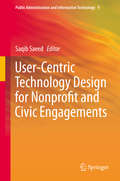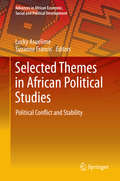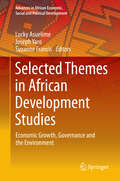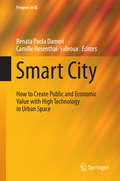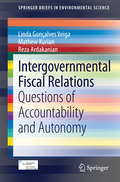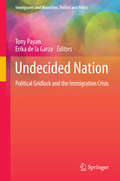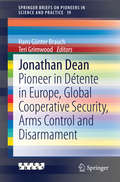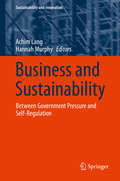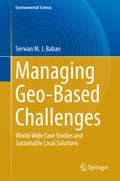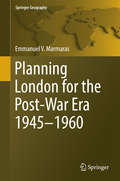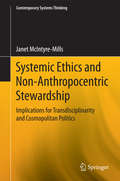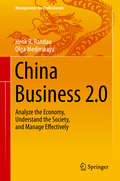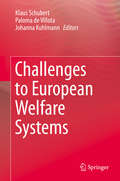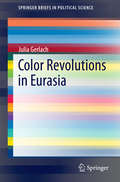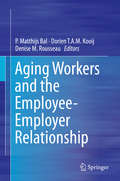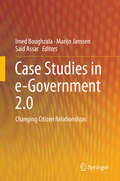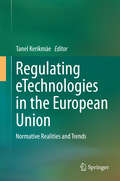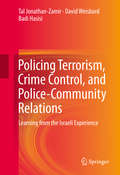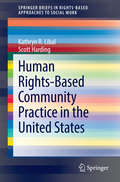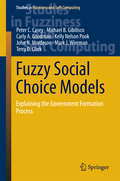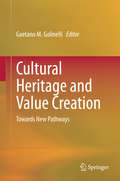- Table View
- List View
User-Centric Technology Design for Nonprofit and Civic Engagements
by Saqib SaeedDue to the increased global political importance of the nonprofit sector, its technological support and organizational characteristics have become important fields of research. In order to conduct effective work, nonprofits need to communicate and coordinate effectively. However, such settings are generally characterized by a lack of resources, an absence of formal hierarchical structures and differences in languages and culture among the activists. Modern technologies could help nonprofit networks in improving their working. In order to design appropriate technological support for such settings, it is important to understand their work practices, which widely differ from traditional business organizations. This book aims to strengthen the body of knowledge by providing user studies and concepts related to user centered technology design process for nonprofit settings. The examination of ethnographic studies and user centered evaluation of IT artifacts in practice will further the understanding of design requirements of these systems. This book includes chapters from leading scholars and practitioners on the technology design process examining human centered factors. The chapters will focus on developed and developing countries as they both have unique issues in technology design. The book will be useful or of interest to academics from a range of fields including information systems, human computer interaction, computer supported cooperative work and organizational science as well as for government officials and governmental organizations.
Selected Themes in African Political Studies
by Lucky Asuelime Suzanne FrancisAgainst the background of a long and continuing record of political instability in Africa, this edited collection presents a multi-disciplinary approach to selected issues in African political studies. The contributions explore a range of political and conflict situations, discuss efforts to develop indigenous conflict resolution mechanisms and consider some of the key political and economic issues facing the continent. The specific country studies illuminate the diversity of the African continent and indicate the ways in which the political and socio-economic contexts of African states bear directly upon the ability of states to solve political and economic challenges. The volume seeks to present and promote novel analytical frameworks, conceptual approaches and empirical accounts of relevance to scholars working on Africa and to practitioners and policy makers in politics, governance and peace initiatives in Africa.
Selected Themes in African Development Studies
by Lucky Asuelime Suzanne Francis Joseph YaroAgainst the background of realities of underdevelopment and economic growth, environmental pressures and global governance challenges, this volume presents a broad picture of contemporary issues in African development. The multi-disciplinary collection presents a variety of important themes, covering land questions, housing, water, health, economic liberalization, climate, environment, and gender. The specific country studies illustrate the diversity of the African continent and demonstrate how unique contexts impact upon different levels of achievement. The volume seeks to present and promote novel analytical frameworks, new conceptual approaches, and empirical accounts of relevance to scholars studying Africa as well as practitioners in African development and policy makers.
Smart City
by Camille Rosenthal-Sabroux Renata Paola DameriThis book presents a comprehensive overview of the various aspects for the development of smart cities from a European perspective. It presents both theoretical concepts as well as empirical studies and cases of smart city programs and their capacity to create value for citizens. The contributions in this book are a result of an increasing interest for this topic, supported by both national governments and international institutions. The book offers a large panorama of the most important aspects of smart cities evolution and implementation. It compares European best practices and analyzes how smart projects and programs in cities could help to improve the quality of life in the urban space and to promote cultural and economic development.
Intergovernmental Fiscal Relations
by Mathew Kurian Reza Ardakanian Linda Gonçalves VeigaThis book examines and analyzes issues related to public finance in subnational governments, along with a discussion of case studies on decentralization. Most of the analysis applies to all public goods and services provided by subnational governments, with some placed on the role of subnational governments in the management of environmental resources, notably water and waste Coverage includes optimal arrangements for sharing fiscal responsibilities among different levels of government, the potential impact of decentralization on the quality of public goods delivery, local governments' expenditure and revenue choices, and the effect of decentralization on accountability, governance and policy outcomes. The scope of discussion extends to both public finance theory and applied policy debates. The first chapter, on trends in financing of public services, opens with an explanation of the how and why of government intervention in the economy, the nature and purposes of transfers between and among governments and trends in decentralization. Case studies examine the impact of decentralization in such areas as service delivery, water and sanitation, education and health, and on poverty and income inequality. Chapter 2 examines public budgets: governance structures, norms and organizational practices, building up understanding of budgets, budget cycles, fiscal revenues from fees and taxes, expenses, debt and political economy issues, rules mandating balanced budgets in government and more. Chapter 3 discusses issues of accountability and policy outcomes, offering important lessons from recent international experience, including ways to strengthen political, administrative and financial accountability. The concluding chapter recounts lessons from recent international experience and surveys implications for the nexus approach to management of environmental resources. The information, analysis and expert advice presented here is particularly relevant for developing and emerging countries, where well designed decentralization reforms have a higher potential to improve efficiency in the provision of public services, and to enhance the development of integrated and sustainable strategies for the use of water, soil and waste resources and applications that advance the nexus approach.
Undecided Nation
by Tony Payan Erika de la GarzaThere is a broad consensus that the United States' immigration system is broken, yet the political momentum behind the movement has not yet led to a consensus on how to fix it. This momentum has stemmed from the agreement that we have an immigration "crisis" on our hands - millions of undocumented immigrants living and working in the United States under increasingly harsh conditions, tremendous spending on border security and enforcement measures without protection of civil rights, changing voter demographics, and other pressing issues have ushered in the moment for immigration reform. This book presents research and policy recommendations from leading U. S. immigration experts and scholars, who have many valuable insights and nuanced perspectives to offer to the current debate on immigration reform. The goal of this immigration study is to disseminate knowledge and policy recommendations to scholars, government officials, the media, and the general policy community on vital issues regarding the present question of immigration reform. This book discusses the future prospects of immigration reform and delves into various details, options, and obstacles related to immigration reform. The chapters presented shed light on a number of issues that are currently being debated in the immigration bill. Some of them address the salience of the immigration issue in Latino political behavior and the impact of demographic context. Other papers hone in on the landscape of legislative initiatives addressing immigration at the state and local levels, and some authors address the implications of immigration reform for the labor market and economic climate. The book will be of interest to both scholars and policy-makers concerned with immigration in the United States.
Jonathan Dean
by Hans Günter Brauch Teri GrimwoodJonathan Dean (1924-2014) was a distinguished U. S. diplomat (1950-1980) and from 1984 to 2007 global security adviser to the Union of Concerned Scientists, Washington, D. C. During the 1980s and 1990s he was a pioneering conceptual thinker, writer and speaker on détente in Europe, global cooperative security, arms control and disarmament. He authored: Watershed in Europe (1987), Meeting Gorbachev's Challenge (1989) and Ending Europe's Wars (1994). This volume contains his biography and bibliography, six texts on détente and arms control in Europe in the 1980s: Beyond First Use; MBFR; Alternative Defence; Berlin; A Crisis Management Center; Conventional Arms Control in Europe and six texts on the new security order in Europe since the 1990s: Components of a Post-Cold War Security System for Europe; Constraining Technological Weapons Innovation; NATO Enlargement: Act II; Ten Years after the Wall; Future Security in Space; Rethinking Security: Return to the Grotean Pattern.
Neurocognitive Risk Assessment for the Early Detection of Violent Extremists
by Geoff DeanThis Brief provides a theoretical and conceptual development of a new Risk Assessment Toolbox (RAT) for the early detection of violent extremists. It is based on a neurocognitive perspective, conceptualized as 'neuroplasticity-in-action' arising from brain-based neural patterns expressed in mind-based cognitive pathways likely to form a mind-set of violent extremism. This neurocognitive-based Risk Assessment Toolbox (RAT) is comprised of two distinct components: a cognitive indicators instrument that serves as an early detection checklist for trained practitioners, and a software visualisation program. The Brief includes: A framework of contemporary approaches to the risk assessment of violence as well as the background context for the current research project on 'violent extremism' and its related concepts of 'terrorism' and 'radicalisation,' out of which the RAT was developed. A detailed overview of RAT and a pilot case study experiment to highlight the practical value and utility of this neurocognitive Risk Assessment Toolbox. Preliminary research findings of a study conducted with a sample of recognized experts (academics and practitioners) in several countries around the world, to fine tune and validate the risk parameters of the two components that constitute RAT (Risk Assessment Toolbox). The current stage of development of RAT as a practitioner-based system for the early detection of potentially violent extremists as well as its strategic intelligence implications for using a neurocognitive risk assessment approach to violent extremism is discussed. Research limitations and plans for future research studies. This work will be of interest to researchers in Criminology and Criminal Justice interested in studying violent extremism, terrorism and crime prevention and intervention and policing, as well as researchers in related fields of Forensic Psychology, Cognitive Neuroscience and Social Work or Social Intervention.
School Size Effects Revisited
by Jaap Scheerens Hans Luyten Maria HendriksThis book provides a thorough review of the research literature on the effect of school size in primary and secondary education on three types of outcomes: student achievement, non-cognitive outcomes and costs per student. Based on 84 scientific publications and several prior reviews, the book discusses four main areas: the impact of school size on cognitive learning outcomes and non-cognitive outcomes; the "state of the art" of empirical research on economies of size; the direct and indirect impact of school size, conditioned by other school context variables on student performance and the specific position of the Netherlands in an international perspective. The book presents summaries of the results and main conclusions found and discusses these with respect to their relevance for educational policy in general and for the Netherlands in particular. The book concludes with suggestions for future research on school size.
Business and Sustainability: Between Government Pressure and Self-Regulation (Sustainability and Innovation)
by Achim Lang Hannah MurphyDemands for sustainability policies have set new challenges for business both on the individual firm level and on the level of organized business interests. This edited volume brings together economic, social, environmental, and cultural dimensions of sustainability that comprise different challenges for business processes and activities. The aim is to develop an overarching framework to the study of sustainability and business and to advance an interdisciplinary analytical perspective. The book establishes a balanced account that equally represents business as problem causers as well as problem solvers, and therefore responds to the urgent need to investigate the intersection between sustainability issues and business participation.
Managing Geo-Based Challenges
by Serwan M. J. BabanThis book provides sound conceptual understanding of the current approach to management and decision making regarding geo-based challenges in developing countries that tend to suffer from information poverty and subjectivity and are reactive. The book also provides the necessary technical tools to energize research thinking and develop locally driven practical and sustainable solutions, ultimately moving management and decision making from being reactive to being proactive. This book fills a void as there are no published books to show the way forward or to present real case studies for this purpose. Case studies that utilize new technologies and scientific thinking are presented for developing sustainable management options based either on producing local applied research or on utilising relevant international research. These case studies are based on the author's first-hand experiences in arid/semi-arid (Iraq, Tunisia, Morocco and Jordan), temperate (UK) and tropical environments (Malaysia, the Caribbean region, Indonesia and Australia).
Planning London for the Post-War Era 1945-1960
by Emmanuel V. MarmarasThis book deals with the formation of the post-Second World War reconstruction and planning machinery in Great Britain, the re-planning efforts undertaken in post-war London, and in particular the redevelopment programme regarding its central area in the form of the comprehensive development projects. Originating from a PhD Thesis, the book recreates the atmosphere following step by step arguments and events at various political, socio-economic and technical levels. It also contributes to the understanding of succeeding developments in terms of planning theory and practice. The book is structured into three parts. The first one explores the administrative and statutory developments in town planning matters during the period 1940-59. The second part deals with the plans proposed for London as a whole from independent and official organisations mainly during the 1940s. Finally, the third part examines the proposed projects for the rebuilding of the City of London and for special areas of Central London that suffered from bombing on both sides of the Thames.
Systemic Ethics and Non-Anthropocentric Stewardship
by Janet Mcintyre-MillsThis book makes a case for rights and responsibilities to be expressed through a cosmopolitan praxis based on developing strong cosmopolitan approaches. This developed approach respects a form of cultural or national identity that is not at the expense of others, the environment or future generations. This new stoicism is based on a sense of responsibility for others. The book also explores systemic ethical praxis in response to the vexed challenge of how to bridge the false dualism of pitting the environment versus profit Systemic Ethics and Non-Anthropocentric Stewardship: Implications for Transdisciplinarity and Cosmopolitan Politics is organized into seven chapters. The book begins by providing readers with an understanding of the way in which cosmopolitanism (like all social concepts) is shaped by diverse definitions and applied differently by theorists and those that engage in transformative praxis. It also develops an argument based on considering the empirical consequences of social, economic and environmental decisions on the quality of life of current and future generations. The next chapter critiques anthropocentricism and explores how policy makers develop agreements on what constitutes and supports the wellbeing of the planet rather than the GDP. The book then explores the options for social democracy and ways to enhance an ethical approach to post national governance and argues for participatory democracy and governance to respond to diversity within and across national boundaries. The following chapters reflect upon the author's own participatory action research process and examines the transformations that can arise through critical systemic thinking and practice. Next the book makes the case for systemic ethical governance that is able to manage consumption, before concluding with a final look at the book's approach, based on critical heuristics.
China Business 2.0: Analyze the Economy, Understand the Society, and Manage Effectively (Management for Professionals)
by Henk R. Randau Olga MedinskayaChina is entering a new stage of economic and societal development, called China 2. 0, a new era that is characterized by China's diminishing low-cost advantage and increased local competition. Succeeding in the China 2. 0 era will require western managers to reposition their businesses. Inspired by their extensive experience in doing business in China, the authors present more than 40 key issues in a compact format suitable for time-constrained executives. The book covers the overall effects on the economy, highlights future challenges, gives first-hand advice on how to manage a business in China, and helps the reader to understand the Chinese culture. China Business 2. 0 also contains valuable insight sections in which top executives and consultants share their on-the-ground experiences in China. In addition, it features numerous practical tips that will help managers to be effective in China.
Challenges to European Welfare Systems
by Klaus Schubert Paloma De Villota Johanna KuhlmannThis book provides the first comprehensive analyses of the challenges all European welfare systems have been facing since 2007, combining in-depth country-based studies and comparative chapters. It identifies four main challenges for European welfare systems: 1) the economic and financial crisis, 2) demographic change, 3) the balance between avoiding risks and opening up opportunities in social policy, and 4) legitimacy. It shows that European welfare systems tend to face the same challenges but in different ways and that, accordingly, their responses to those challenges differ considerably. Although the EU also plays a part in shaping national welfare systems, it becomes evident that European welfare systems are by no means converging: in terms of social policy, national diversity within Europe is still a major factor that will shape future developments in European welfare systems.
Color Revolutions in Eurasia (SpringerBriefs in Political Science)
by Julia GerlachWhy have large-scale protests and mass demonstrations in some post-socialist Eurasian states led to the fall of autocratic leaders, whereas similar other regimes prevail? This book addresses the question by providing an overview of eight cases of so-called Color Revolutions, and explains factors of 'success' and 'failure' by discussing the state-of-the-art in the political science discourse on Color Revolutions. It concludes by summarizing and contextualizing the results of the analysis and highlighting open research for political science on the theme of Color Revolutions.
Law and Religious Cultural Heritage in Europe
by Theodosios TsivolasThis book examines in detail both historical and current legal concepts of 'religious cultural heritage' within the context of the European continent. The latter group is primarily based on the variety of sacred cultural elements emanating from the different religious traditions of the peoples of Europe, which are deemed worthy of protection and preservation due to their outstanding value, in terms of their social, cultural and religious significance. In view of this, the study provides evidence of the European States' active involvement with their sacred/cultural treasures, on the basis of the political and legal foundations of neutrality and pluralism. Furthermore, the book analyzes all relevant international legislative instruments (i. e. the plethora of EU, EC and UNESCO norms), as well as all major European legislative patterns, in light of their significance for the aforementioned aspects of pluralism and neutrality. The interdisciplinary references listed at the end of each chapter provide an additional incentive for further reading on the subject matter. The most important finding to emerge from the study is that there is a shared legal ethos in Europe that imposes a duty of appropriate care concerning the vast variety of sacred cultural goods and the religious cultural heritage in general, as an invaluable repository of European cultural capital. It also considers the sui generis nature of this capital: like any other type of asset, it may deteriorate or fade over time, necessitating investment in its preservation or refurbishment; nevertheless, like no other, this particular capital maintains a distinct cultural value, as it contains an additional characteristic of 'sacredness' expressed in the form of its 'religious character,' the latter being analyzed as a triptych of religious memory, religious aesthetics and religious beliefs.
Aging Workers and the Employee-Employer Relationship
by Denise M. Rousseau P. Matthijs Bal Dorien T.A.M. KooijThis book focuses on the aging workforce from the employment relationship perspective. This innovative book specifically focuses on how organizations can ensure their aging workers remain motivated, productive and healthy. In 15 chapters, several experts on this topic describe how organizations through effective human resource management can ensure that workers are able to continue working at higher age. In addition, this book discusses the role older workers themselves play in continuing work at higher age. To do this, the authors integrate research from different areas, such as literature on leadership, psychological contracts and diversity with literature on the aging workforce. Through this integration this book provides innovative ways for organizations and workers to maintain productivity, motivation and health. Aging Workers and the Employee-Employer Relationship summarizes the latest research on how employment relationships change with age and its implications for supporting the well-being, motivation and productivity of older workers. It identifies ways to improve how both companies and workers solve the problems they face. These include better designed employment practices and more adaptive job content and developmental opportunities for aging workers along with activities aging workers can engage to enhance their own job crafting, learning and employability.
Case Studies in e-Government 2.0: Changing Citizen Relationships
by Saïd Assar Imed Boughzala Marijn JanssenThe goal of this book is to provide a comprehensive, multi-dimensional approach to research and practice in e-government 2. 0 implementation. Contributions from an international panel of experts apply a variety of methodological approaches and illustrative case studies to present state-of-the-art analysis and perspectives. Around the world, governments are employing technological advancements to revolutionize their ways of working, resulting in changing relationships among public organizations and their constituents. Important enablers are new uses of information and knowledge-sharing technologies that emerged with the advent of the Web 2. 0 paradigm; initially used in the private arena, such user-friendly, participatory, intuitive and flexible Web 2. 0 technologies (e. g. , blogs, Wikis, RSS, social networking platforms, folksonomy, podcasting, mashups, virtual worlds, open linked data, etc. ) are increasingly disseminated within the professional sphere, regardless of organization type or field of activities. Current e-government environments have undergone considerable transformations in an attempt to satisfy the incessant demand for more advanced e-service delivery, better access to information and more efficient government management. Looking to the future, the emergence of Web 2. 0, the rise of social networks and the wider dissemination of data and information are expected to generate many benefits, such as a better match between public services and citizens' expectations, greater adoption of online services by citizens and better control of costs and prevention of delays in the implementation of new services. Governments around the world are building frameworks and proposals for e-government 2. 0, in the hopes of improving participation, transparency and integration, while speeding up the pace of innovation through collaboration and consultation. This volume addresses a gap in the research literature, offering timely insights on the e-government 2. 0 phenomenon and directions for future practice and policy.
Regulating eTechnologies in the European Union
by Tanel KerikmäeThe EU strategy 2020 includes ambitious plans for e-regulation that could improve Europe's competitiveness. However, the European states have very different legal frameworks in this field. This book introduces flagship initiatives and provides a detailed overview and analysis of the current standards and latest developments, offering practical insights and guidelines for practitioners and policy-makers alike. Further, as it discusses the main areas of e-regulation, it can serve as a useful platform for university education in light of the growing need for new kinds of specialists, i. e. IT lawyers. The book concentrates on fields that are directly affected by e-regulation such as cyber-security, databases, computer programs, e-governance, IP and competition law and informatics.
Policing Terrorism, Crime Control, and Police-Community Relations
by David Weisburd Tal Jonathan-Zamir Badi HasisiThis timely and important work takes a critical look at the shifting role of police, who are becoming increasingly responsible for handling terrorism threats on top of their regular responsibilities. With an unprecedented empirical study, the authors of this book examine whether this increased focus on security-related threats may come at the expense of addressing "classic" police responsibilities, such as fighting crime and dealing with local, day-to-day community problems. They also examine whether this shift has had a detrimental effect on police-community relationships and perceptions of police legitimacy, as their role changes from "service" to "suspicion. " Through a four-year, multi-method study specifically focused on the Israel National Police, the authors of this work have examined the effects of this shifting role on a number of key areas of policing concern, namely: police effectiveness at fighting crime and police legitimacy, drawing conclusions applicable to any democratic police force. The results of the study provide a number of concrete recommendations for maintaining effectiveness and community relationships of the police, with increasing responsibilities, challenges, and limited resources. This work will be of interest for researchers in criminology and criminal justice, particularly with a focus on police studies and counter-terrorism; police administrators; and researchers in related disciplines, such as sociology and public administration.
Human Rights-Based Community Practice in the United States
by Kathryn R. Libal Scott HardingA transformative model for community social work rooted in basic social and economic rights is the basis of this timely Brief. With specific chapters spotlighting the rights to health care, nutritious food, and adequate and affordable housing, the book describes in depth the role of community practice in securing rights for underserved and vulnerable groups and models key aspects of rights-based work such as empowerment, participation, and collaboration. Case examples relate local struggles to larger regional and statewide campaigns, illustrating ways the book's framework can inform policymakers and improve social structures in the larger community. This rights-based perspective contrasts sharply with the deficits-based approach commonly employed in community social work, and has the potential to inspire new strategies for addressing systemic social inequality. Features of Human Rights-Based Community Practice in the United States: A conceptual basis for a rights-based approach to community practice. Detailed analysis of legal and social barriers to health care, housing, and food. Examples of effective and emerging rights-based community interventions. Methods for assessing the state of human rights at the community level. Documents, discussion questions, resource lists, and other valuable tools.
Fuzzy Social Choice Models
by Peter C. Casey Michael B. Gibilisco Carly A. Goodman Kelly Nelson Pook John N. Mordeson Mark J. Wierman Terry D. ClarkThis book explores the extent to which fuzzy set logic can overcome some of the shortcomings of public choice theory, particularly its inability to provide adequate predictive power in empirical studies. Especially in the case of social preferences, public choice theory has failed to produce the set of alternatives from which collective choices are made. The book presents empirical findings achieved by the authors in their efforts to predict the outcome of government formation processes in European parliamentary and semi-presidential systems Using data from the Comparative Manifesto Project (CMP), the authors propose a new approach that reinterprets error in the coding of CMP data as ambiguity in the actual political positions of parties on the policy dimensions being coded. The range of this error establishes parties' fuzzy preferences. The set of possible outcomes in the process of government formation is then calculated on the basis of both the fuzzy Pareto set and the fuzzy maximal set, and the predictions are compared with those made by two conventional approaches as well as with the government that was actually formed. The comparison shows that, in most cases, the fuzzy approaches outperform their conventional counterparts.
The FDA for Doctors
by William H. EaglsteinMany doctors want to know more about the FDA not only so that they might better understand the issues and how they are related to their practice, such as off label-drug usage, but also to enrich their professional lives and allow them to more deeply understand the many FDA related articles written in the popular press It is further based on the notion that doctors prefer a formal way to learn about FDA. The Agency is a truly vast subject engaging thousands of lawyers, regulators, scientists, physicians, writers, legislators and many others directly and indirectly. This book is an introductory overview written from a physician's perspective for physicians It is organized along lines that emphasize issues most interesting to physicians. Much of it deals with nomenclature and definitions, since as is true of all fields, one must understand the special concepts and vocabulary of the field.
Cultural Heritage and Value Creation: Towards New Pathways
by Gaetano M. GolinelliInformed by systems thinking, this book explores new perspectives in which culture and management are harmoniously integrated and cultural heritage is interpreted both as an essential part of the social and economic context and as an expression of community identity. The combination of a multidisciplinary approach, methodological rigor and reference to robust empirical findings in the fertile field of analysis of UNESCO's contribution mean that the book can be considered a reference for the management of cultural heritage. It casts new light on the complex relation of culture and management, which has long occupied both scholars and practitioners and should enable the development of new pathways for value creation. The book is based on research conducted within the framework of the Consorzio Universitario di Economia Industriale e Manageriale (University Consortium for Industrial and Managerial Economics), a network of universities, businesses and public and private institutions that is dedicated to the production and dissemination of knowledge in the field. This volume will be of interest to all who are involved in the study and management of the cultural heritage.
